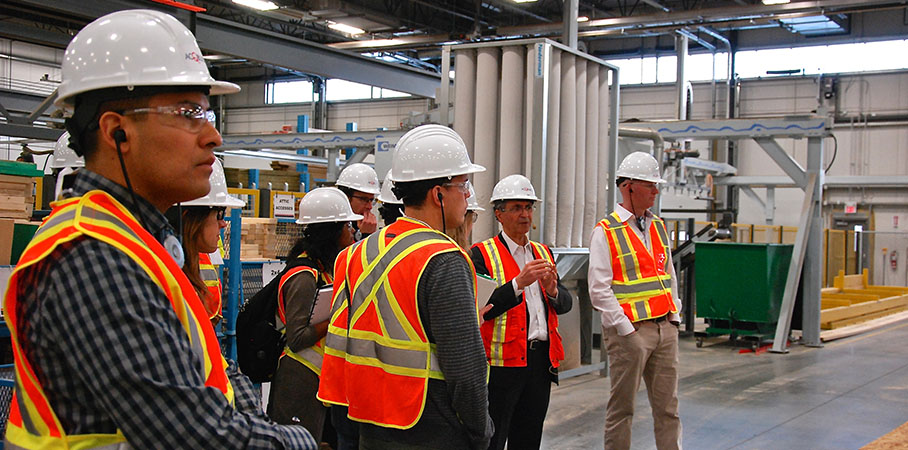
A group of Fellows visits Landmark Group/AcQbuilt’s innovative net-zero home production facility before engaging with founder and CEO Reza Nasseri and the Landmark transition story (Edmonton, Jan 2016)
“It’s easy for people to have opinions, and be wildly pro or against something. But Fort McMurray is the literal front line of our national energy industry. It’s the bleeding edge of the boom bust cycle, that’s what this community experiences. I think it’s really important for people, when having a provincial or even national energy system conversation to have a bit of an experience of what it’s actually like up there.”
Sean Collins
Can we credibly explore the energy transition in Alberta and not visit Fort McMurray? Next month the EFL Fellows are coming together for their third in-person workshop. This time they are setting aside their busy schedules and journeying to the city that in many ways is a ground zero for the big issues and debates about the province’s energy future.
For years, Fort McMurray and the vast oil sands resource surrounding it, have been a focus of criticism nationally and internationally and the poster child for those highlighting Canada’s reputation as a laggard on climate policy, spurring visits from the likes of James Cameron, Leonardo DiCaprio, and Desmond Tutu. These visits have often intensified the polarization around energy, climate and the future role of these high carbon resources.
EFL Fellow Sean Collins, born and raised in Fort McMurray, is looking forward to having his Lab colleagues join him in his hometown next month. “It’s easy for people to have opinions, and be wildly pro or against something. But Fort McMurray is the literal front line of our national energy industry. It’s the bleeding edge of the boom bust cycle, that’s what this community experiences. I think it’s really important for people, when having a provincial or even national energy system conversation to have a bit of an experience of what it’s actually like up there.”
We agree. The first day and a half in Fort McMurray will be spent on “Learning Journeys” before the Fellows take the new insights garnered from these explorations to refine their prototypes and high leverage lab initiatives in the 2-day workshop that follows.
Learning journeys are an opportunity for the Fellows to broaden and deepen their understanding of the current system, and to engage with a diversity of people and perspectives that they are not regularly exposed to. In Fort McMurray, the EFL Fellows won’t be exposed to ‘canned’ presentations, but rather hosts and visitors engaging in open and honest dialogue. Interacting with real people and real communities ensures that the challenges and complexity we are trying to address in the Lab don’t just exist on paper or in our heads, but that we also have some lived experience of them.
These are journeys outside of our day-to-day experiences and narratives, and outside of our own assumptions and paradigms. That may sound exciting or it may sound scary, but we do know this is an essential part of the hard work of collaborating with diverse stakeholders on our most complex challenges.
We applaud the Energy Futures Lab Fellows for stepping directly and bravely into this inquiry. They will be wrestling with some of the toughest questions around energy transition from numerous angles – the role of fossil fuels in a low carbon future, the possibilities for resilience in resource dependent communities, and so on.
The future of a high carbon resource in a low carbon economy
A group of fellows will see the footprint of the oil sands from the air, tour an oil sands mine and visit Ft McKay to engage with a variety of community members affected in different ways by oil sands development.
Whether fellows have made countless trips to Fort McMurray or will be visiting for the first time, they will be challenging one another to ‘see with new eyes’, and to avoid letting the experience simply reinforce pre-existing narratives. For example, can the engineers in the group who may tend to be wowed by the engineering marvel of the oil sands view it through the lens of an aboriginal elder as ‘keeper of the land’, or perhaps take the perspective of a future generation?
Building community resilience in a time of energy transition
Meanwhile, another group of fellows will visit some of the community’s social service organizations – shelters, employment agencies, food banks, and engage in dialogue with Mayor Melissa Blake. Others will tour a local First Nation-owned and operated company, and engage further with the Regional District, the business community and the region’s Social Prosperity road map.
They will be wading into debates about whether this is a time to grin and bear it and hope for an oil price rebound, or whether this is a moment to tackle some of the tougher, deeper questions around resilience, transition and our shared future.
We expect to uncover many challenges, and also to be inspired by some new ideas for solutions. Undoubtedly there will be numerous lessons that are equally applicable to other towns across Alberta – from Medicine Hat to Grande Prairie, Hanna to Rocky Mountain House.
And of course there are things that are unique to Fort McMurray as well. When I asked EFL Fellow Sean Collins what not to miss when we visit his hometown he replied, “Don’t miss the raw emotion of Fort McMurray. It’s different. People swear, people are rough around the edges. And people are super genuine and caring. I find Fort McMurray to be a more unpolished version of the rest of Alberta. To get an accurate portrayal of Fort McMurray, I wouldn’t try to polish the edges too much.”

Alison Cretney manages the Energy Futures Lab and is Director, Knowledge and Design at the Natural Step Canada.



